neutrality
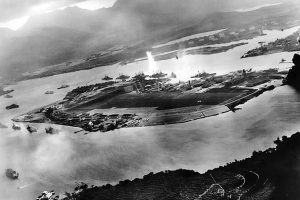
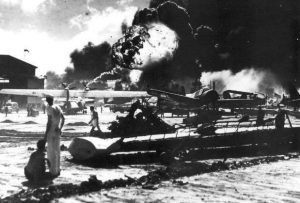 It doesn’t matter how many years have gone by since that horrible December day 76 years ago today, I don’t think that anyone who knows anything about the attack on Pearl Harbor can forget just how horrific it was. I suppose they should have known that an attack was imminent, or at the very least suspected it. Diplomatic negotiations with Japan had broken down, and President Franklin D. Roosevelt and his advisers knew that an imminent Japanese attack was probable. Still, nothing had been done to increase security at the important naval base at Pearl Harbor. It was critical mistake that would cost a total of 2,400 Americans their lives. In addition, 1,200 were wounded, many while valiantly attempting to defend Pearl Harbor from the attack.
It doesn’t matter how many years have gone by since that horrible December day 76 years ago today, I don’t think that anyone who knows anything about the attack on Pearl Harbor can forget just how horrific it was. I suppose they should have known that an attack was imminent, or at the very least suspected it. Diplomatic negotiations with Japan had broken down, and President Franklin D. Roosevelt and his advisers knew that an imminent Japanese attack was probable. Still, nothing had been done to increase security at the important naval base at Pearl Harbor. It was critical mistake that would cost a total of 2,400 Americans their lives. In addition, 1,200 were wounded, many while valiantly attempting to defend Pearl Harbor from the attack.
It was Sunday morning, and many military personnel had been given passes to attend religious services off base. It should have been a quiet, peaceful, relaxing day. At 7:02am, two radar operators spotted large groups of aircraft in flight toward the island from the north. With a flight of B-17s expected from the United States at the time, they were told to sound no alarm. They were told wrong. At 7:55am Hawaii time, the peaceful day was shattered when, a Japanese dive bomber bearing the red symbol of the Rising Sun of Japan on its wings appeared out of the clouds above the island of Oahu. A swarm of 360 Japanese warplanes followed, descending on the United States naval base at Pearl Harbor. It was a ferocious assault. The surprise attack struck a critical blow against the United States Pacific fleet and drew the United States into World War II…like it or not. The Japanese air assault came as a devastating surprise to the naval base. Much of the Pacific fleet was rendered useless. There was simply no time to act. The window of opportunity for them to act was missed when no warning was given. Five of eight battleships, three destroyers, and seven other ships were sunk or severely damaged, and more than 200 aircraft were destroyed. Japan’s losses were some 30 planes, five midget submarines, and fewer than 100 men, and many of these were intentional suicide bombers. Fortunately for the United States, all three Pacific fleet carriers were out at sea on training maneuvers. These giant aircraft carriers would have their revenge against Japan six months later at the Battle of Midway, in a battle that would reverse the tide against the previously invincible Japanese navy in a spectacular victory.
The day after Pearl Harbor was bombed, President Roosevelt appeared before a joint session of Congress and declared, “Yesterday, December 7, 1941…a date which will live in infamy…the United States of America was suddenly and deliberately attacked by naval and air forces of the Empire of Japan.” After a brief and forceful speech, he asked Congress to approve a resolution recognizing the state of war between the United States and Japan. Finally, the president had taken action. The Senate voted for war against Japan by 82 to 0, and the House of Representatives approved the resolution by a vote of 388 to 1. The sole dissenter was Representative Jeannette Rankin of Montana, a devout pacifist who had also cast a dissenting vote against the United States 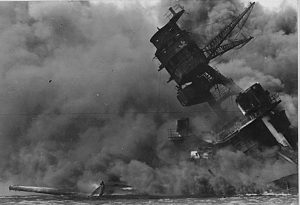
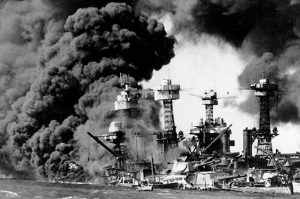 entrance into World War I. Three days later, Germany and Italy declared war against the United States, and the United States government responded in kind. The American contribution to the successful Allied war effort spanned four long years and cost more than 400,000 American lives. The attack on Pearl Harbor was a vicious attack that shows us that in a war, neutrality is not a guarantee of safety, but is rather viewed as a sign of weakness.
entrance into World War I. Three days later, Germany and Italy declared war against the United States, and the United States government responded in kind. The American contribution to the successful Allied war effort spanned four long years and cost more than 400,000 American lives. The attack on Pearl Harbor was a vicious attack that shows us that in a war, neutrality is not a guarantee of safety, but is rather viewed as a sign of weakness.
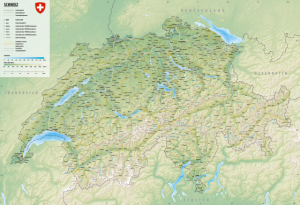 I think most of us know that a conscientious objector is a person who feels strongly about not killing…even in a war. However, there are actually entire countries who believe that way…or almost. The most well known country to claim neutrality is Switzerland. Other countries to claim non-interventionist stances include Ireland, Austria, and Costa Rica, but Switzerland is remains the oldest and most respected of them all. In fact, Switzerland has been in a state of perpetual neutrality for centuries. This state of neutrality does not mean they do not have an army, because they do. The country maintains an army for defense purposes and requires part-time military service from all males between the ages of 18 and 34. So how did this state of perpetual neutrality come about, and what does it mean exactly?
I think most of us know that a conscientious objector is a person who feels strongly about not killing…even in a war. However, there are actually entire countries who believe that way…or almost. The most well known country to claim neutrality is Switzerland. Other countries to claim non-interventionist stances include Ireland, Austria, and Costa Rica, but Switzerland is remains the oldest and most respected of them all. In fact, Switzerland has been in a state of perpetual neutrality for centuries. This state of neutrality does not mean they do not have an army, because they do. The country maintains an army for defense purposes and requires part-time military service from all males between the ages of 18 and 34. So how did this state of perpetual neutrality come about, and what does it mean exactly?
The earliest attempt by Switzerland, at neutrality came in 1515 when the Swiss Confederacy suffered a devastating loss to the French at the Battle of Marignano. After that, the country abandoned any thought of expanding it’s borders in an attempt to avoid future conflict. All this was done in the interest of self-preservation. The Napoleonic Wars, however, truly sealed Switzerland’s place as a neutral nation. Switzerland was invaded by France in 1798 and was later made a satellite of Napoleon Bonaparte’s empire, forcing it to compromise its neutrality. Napoleon was defeated, and the major European powers decided that a neutral Switzerland would provide a much needed buffer zone between France and Austria. It was assumed that their neutrality would bring stability to the region. Then during the 1815 Congress of Vienna, a declaration was signed affirming Switzerland’s state of “perpetual neutrality” within the international community. In 1920, the newly formed League of Nations officially recognized Swiss neutrality and established its headquarters in Geneva.
Switzerland’s state of perpetual neutrality has not been without it’s challenges. In World War I, it mobilized its army and accepted refugees but also refused to take sides militarily. An even bigger challenge to Switzerland’s neutrality came in World War II, when the country was surrounded by Axis powers. Switzerland continued in its neutral stance, saying that they would retaliate in the event of an invasion, but would not enter the war. Nevertheless, they continued to trade with Nazi Germany, a decision that caused controversy after the war ended.
After World War II, Switzerland has been active in international affairs by siding with humanitarian initiatives, while maintaining its neutrality when it came to military issues. 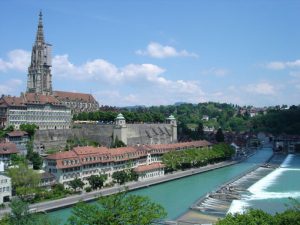 Switzerland refuses to join NATO or the European Union, and only joined the United Nations in 2002. In my opinion it might as well have stayed out of the United Nations entirely. I understand the desire to stay neutral and out of wars, but to me it seems a little bit like walking the fence. They want the good that’s offered without having to hold the evil nations accountable for their actions. I realize the Switzerland has done things for the rest of the world, but it still seems like a bit of a cop out when their trade is not affected because they refuse to argue the evil that some nations do.
Switzerland refuses to join NATO or the European Union, and only joined the United Nations in 2002. In my opinion it might as well have stayed out of the United Nations entirely. I understand the desire to stay neutral and out of wars, but to me it seems a little bit like walking the fence. They want the good that’s offered without having to hold the evil nations accountable for their actions. I realize the Switzerland has done things for the rest of the world, but it still seems like a bit of a cop out when their trade is not affected because they refuse to argue the evil that some nations do.

